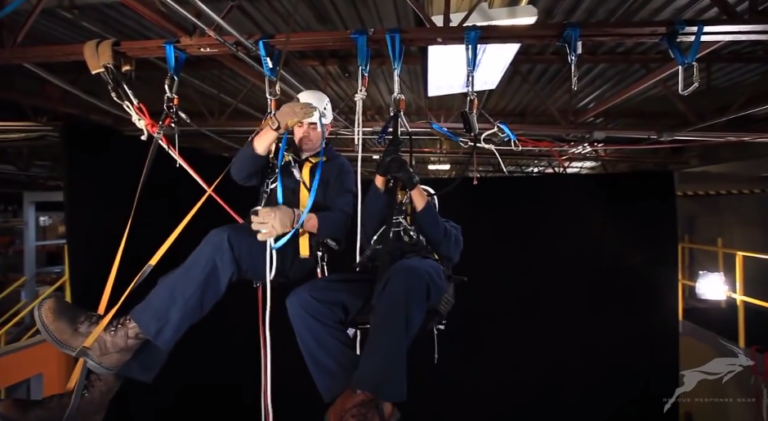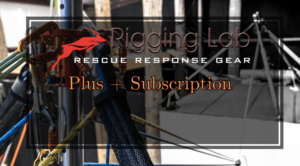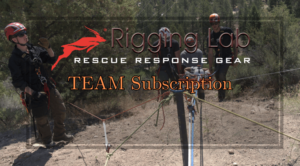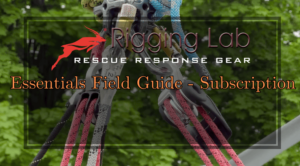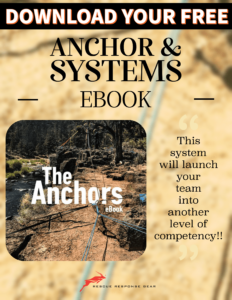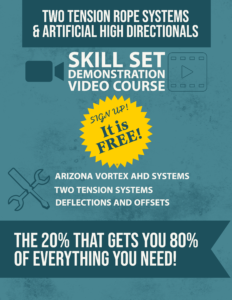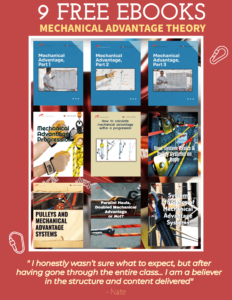In the realm of rope rescue operations, proficiency is not just a goal; it’s a necessity that can make the difference between success and uncertainty. Imagine having the knowledge and skill set to navigate complex scenarios, armed with a toolkit of essential gear and systems that empower your actions. This journey to rope rescue mastery unfolds through a carefully crafted three-step process, guiding you from the bedrock of fundamentals to the pinnacle of expertise. With a commitment to refining your skills and harnessing the potential of specialized gear, this approach is your gateway to unlocking unparalleled competence in the art of rope rescues.
Step 1: Establishing Rescue Gear Knowledge as a Foundation – the fundamental basis, support, or groundwork upon which something, whether physical, conceptual, or organizational, is built.
We have extensively discussed the significance of possessing a profound familiarity and comprehension of the equipment employed in your rescue rigging systems. Each component is interconnected, forming a cohesive functioning unit. It is inadequate to solely grasp rescue carabiners, rescue ropes, rescue pulleys, or even the mechanical forces affecting the gear. Instead, a comprehensive understanding of the entirety is imperative, as any vulnerability can have significant consequences.
- Comprehensive Training: Begin with an in-depth training program focused on rope rescue techniques, gear functions, and the science behind effective rescue systems. This foundation will provide you with a thorough understanding of both theoretical concepts and practical skills.
- Gear Proficiency: Explore the range of essential gear available at Rescue Response Gear. Delve into the technical aspects, applications, and advantages of different equipment. This knowledge will empower you to make informed decisions when choosing gear for specific rescue scenarios.
Step 2: Practical Application and Skill Refinement – encompass the process of actively using and honing learned abilities in real-world situations to achieve effective and improved results.
Over time, through consistent practice, you’ll witness the tangible results of refining how you allocate energy and resources. Effective leadership, driven by genuine intentions, aligned seamlessly with rope rescue technicians who possess an intricate understanding of operational objectives, will elevate precision to a level that transcends the foundational goal of mere “efficient rigging.”
- Scenario-Based Learning: Engage in scenario-based learning that simulates real-world rope rescue challenges. These exercises will require you to apply your theoretical knowledge to solve complex problems using the gear and systems covered in your training.
- Hands-On Workshops: Participate in hands-on workshops that replicate authentic rescue situations. These workshops provide the opportunity to practice with actual gear, refine techniques, and develop the confidence to handle challenging scenarios.
Step 3: Advancing Expertise and Continuous Growth Through Hands-on and Online Training – refer to the ongoing journey of acquiring deeper knowledge, refining skills, and expanding one’s capabilities to achieve higher levels of proficiency and development.
- Advanced Training Tracks: Progress into advanced training tracks designed to elevate your proficiency. Focus on mastering specialized skills, exploring intricate gear applications, and tackling advanced rescue scenarios. These tracks cater to those aspiring to achieve mastery in both technical skills and gear utilization.
- Certification and Professional Community: Earn certification upon successfully completing advanced training tracks. This certification acknowledges your expertise in both rope rescue techniques and gear utilization. Join a community of certified rope rescue professionals, where you can collaborate, share insights, and contribute to the continuous improvement of the field.
- Sustained Learning Resources: Access a repository of ongoing learning resources. Stay up-to-date with gear advancements, review techniques, and explore case studies. This ensures your skills and knowledge remain current, allowing you to adapt to evolving challenges and innovations in the rope rescue domain.
The concept of “being an expert” can sometimes carry misconceptions or misnomers, including:
- Infallibility: Assuming that experts are always right or never make mistakes. In reality, even experts can make errors or encounter situations outside their expertise.
- Static Knowledge: Believing that expertise is a fixed state. Fields evolve, and what constitutes expertise can change with advancements.
- Universal Expertise: Expecting experts to excel in all aspects of their field. Expertise often involves specialization in specific areas.
- Lack of Learning: Assuming experts have nothing left to learn. Experts continually learn and adapt to stay current.
- Ease of Explanation: Assuming experts can effortlessly explain complex concepts. Effective communication of expertise is a separate skill.
- Exclusivity: Believing only a select few can achieve expertise. Many individuals can become experts with dedication and practice.
- Fast Achievement: Believing expertise is quickly attainable. Becoming an expert often requires years of dedicated study and practice.
- Automatic Success: Assuming that expertise guarantees success in all endeavors. External factors and circumstances can still influence outcomes.
- Purely Technical: Associating expertise solely with technical skills. Soft skills like communication and collaboration are often integral.
- Age or Experience: Equating expertise solely with age or years in the field. True expertise is marked by continual growth and mastery.
- One-Dimensional: Perceiving experts as solely defined by their professional skills, ignoring their multifaceted identities.
It’s important to recognize that expertise is nuanced, context-dependent, and involves ongoing development. I am not a huge fan of either term (expert or master), however they do apply!
- An expert is someone exceptionally skilled, knowledgeable, and experienced in a particular field or subject.
- Mastery refers to attaining the highest level of skill, understanding, and control in a specific domain or discipline.
While both terms signify high levels of skill and knowledge, “mastery” typically implies a deeper level of understanding, a broader scope of application, and the ability to innovate within the field. Mastery suggests not only proficiency in current practices but also the capacity to push the boundaries and make significant contributions to the field. It can be seen as a higher level of expertise that comes with years of experience, continuous learning, and a profound connection to the subject matter.
By progressing through these steps, you’ll build a solid foundation of knowledge, refine your practical skills, and attain an advanced level of expertise, all in alignment with the goal of unleashing your capability to execute proficient rope rescues using essential gear and systems.
Peace on your Days
Lance

